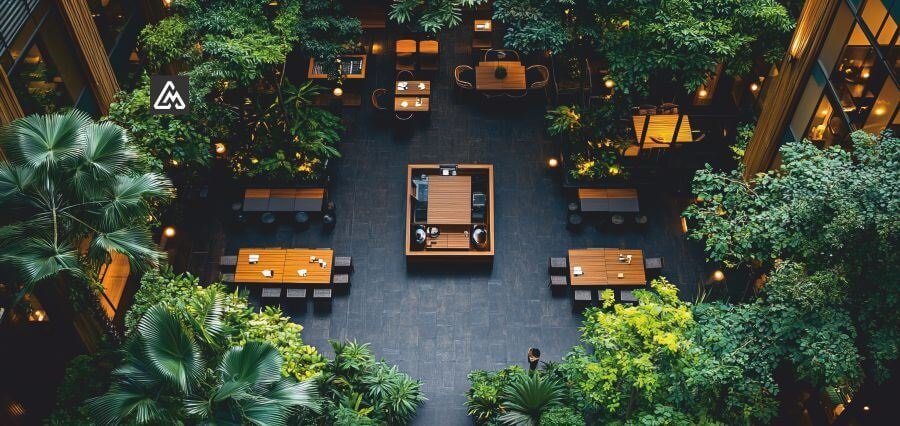In recent years, as people have become increasingly conscious of the environmental impact of human activity, sustainability has become an enormous focus for the hospitality industry. Hotels, inherently resource-intensive, have started greening themselves in response to demand from consumers as well as increasing ecological pressure. From energy saving to waste reduction, hotels are revisiting the way they do business to minimize environmental impact. But this is not only good for the planet; the behavior could add to enhancing the image of a brand attract eco-sensitive customers, and eventually save more money in the long run.
Reducing Consumption and Emissions
The area where hotels are currently at an advantage in sustainability is in the management of energy. Traditionally, the hospitality industry generates a lot of energy use, especially in such areas as heating, cooling, lighting, and water usage, which account for a great percentage of carbon footprint a hotel generates. To counter this, many hotels are investing in energy-efficient systems.
For example, LED lighting is now the norm in most hotels because it consumes significantly less energy than conventional bulbs and lasts much longer, therefore reducing electricity consumption and waste. Smart thermostats and motion-sensor lighting are now quite common in guest rooms. Such systems automatically adjust temperature or turn off lights when guests are not present, thereby helping avoid unnecessary energy consumption.
Hotels are also turning their gaze towards renewable sources of energy. A few fit solar panels on their rooftops and produce their own electricity, while others purchase green energy from renewable sources such as wind farms or solar farms. This further reduces hotels’ reliance on fossil fuels and helps them pump out less carbon dioxide into the atmosphere. Besides that, geothermal heating and cooling systems, as well as wind turbines, are also slowly being implemented in locations where these technologies are possible.
Water Saving
The third major area where hotels are introducing sustainability is water conservation. Hospitality is known for its consumption of water, mainly in larger areas with a pool, spas, and higher frequency in changing linen, so there is a call to introduce water-saving technologies and operational changes that minimise consumption of water.
Many hotels have used low-flow faucets, showers, and toilets in their guest rooms and in public spaces. They are often designed to conserve a good amount of water without making guests uncomfortable. In addition, greywater recycling systems are also being introduced in several hotels that recycle water supplied from sinks, showers, and laundries for use in irrigation and flushing toilets among other uses.
Drought-resistant landscaping is now quickly catching on for larger sites; grounds require less irrigation, especially in drier climates-where much of the savings will come.
Hotels also expect to reduce the frequency of washing linen by encouraging guests to reuse towels during their stays.
Waste Reduction
Reduce, reuse, recycle: waste reduction forms an important component of sustainability in the hospitality industry. Most of them generate a huge amount of waste, especially food waste, packaging material, and guest amenities. A number of hotels are launching waste diversion programs to recycle or compost most of the waste produced.
One of the most common practices is reduction of food waste. Hotels partner with local farms and charities to donate excess food; others have implemented food waste tracking systems to monitor and manage food production in order to ensure efficient usage. Hotels can reduce food waste by not overproducing and offering guests smaller portions.
Besides, hotels are reducing and preventing single-use plastics. They can accomplish this by providing more plastic-free amenities in guest rooms, using refillable soap and shampoo dispensers, and avoiding single-use plastic straws, cups, and packaging in restaurants and cafes. Composting is also growing, especially in the hotel kitchen, as you would divert food scraps from landfills into richening the soil in hotel gardens or community farms.
Environment-Friendly Construction Styles
There is an increased interest in eco-friendly construction styles among hotels. Therefore, during renovation or new construction, more and more hotels turn to sustainable building practices. These not only deal with the usage of environmental-friendly materials but also guide them to place energy-efficient designs on buildings that would otherwise depreciate the development of the hotel.
Many hotels will incorporate sustainable building materials, including reclaimed wood, bamboo, and low-VOC paints, to reduce the environmental footprint of each hotel. Insulation made from recycled content along with energy-efficient windows will help to cut heating and cooling costs as well as overall energy efficiency.
Conclusion
The hospitality industry is moving around the world in the direction of sustainability. Hotels practice energy-efficient technologies, water conservation, waste reduction, and community support. The establishment’s conscious choices will be not only for making a healthier planet but also for those guests who will want meaningful and responsible travel experiences. It is within this cultural landscape that the hotels of the future will show their commitment to a sustainability mindset, representing a cleaner, greener approach to traveling and staying.




